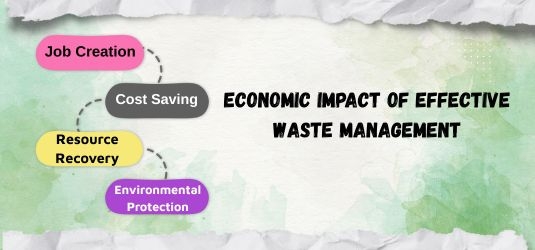
Efficient waste management is vital for both environmental protection and economic growth in modern societies. By adopting systematic waste collection, recycling, and resource recovery, communities can unlock significant benefits. These advantages extend beyond environmental health, supporting job creation, cost savings, and sustainable resource use.
Job Creation and Economic Growth
Efficient waste management generates employment across multiple sectors, including waste collection, sorting, recycling, and disposal. Expanding recycling programs and infrastructure leads to the development of new businesses and industries, further increasing job opportunities. The recycling sector also contributes to local economies through the sale and export of processed materials, supporting domestic industries and trade. By investing in modern waste management, governments can boost economic development and foster a skilled, green workforce.
Resource Conservation and Recovery
Recycling and resource recovery reduce dependence on virgin raw materials and lower the environmental impact of resource extraction. Recycling saves energy and water compared to manufacturing new products from scratch, helping conserve valuable natural resources. Recovering materials like metals from electronic waste or generating energy from organic waste supports a circular economy and sustainable resource management. These practices help protect biodiversity and reduce the ecological footprint of human activities.
Cost Savings and Revenue Generation
Efficient waste management lowers costs for governments, businesses, and households by reducing waste sent to landfills. Recycling and composting are often less expensive than traditional disposal methods, saving money on collection, transportation, and landfill fees. Revenue from selling recycled materials provides an additional income stream for waste management entities and local governments. Optimizing waste systems allows societies to allocate resources more effectively and redirect savings to other priorities.
Environmental Protection and Pollution Mitigation
Proper waste management minimizes pollution of air, water, and soil, reducing health risks for nearby communities. Scientific landfill management, recycling, and composting prevent hazardous chemicals and greenhouse gases from entering the environment. These practices help mitigate climate change impacts and protect ecosystems from contamination and degradation. Cleaner surroundings also improve public health and quality of life for residents.
Development of a Circular Economy
Efficient waste management supports the transition from a linear “take-make-dispose” model to a circular economy. In a circular economy, materials are reused, recycled, and reintegrated into production cycles, minimizing waste and resource depletion. This approach encourages innovation in product design, manufacturing, and recycling technologies, driving long-term sustainability. Societies benefit from reduced environmental strain and increased economic resilience.
Efficient waste management is not only essential for a cleaner environment but also drives economic growth, resource conservation, and sustainable development. By adopting modern waste management strategies, communities can create jobs, save costs, protect natural resources, and build a healthier future.








